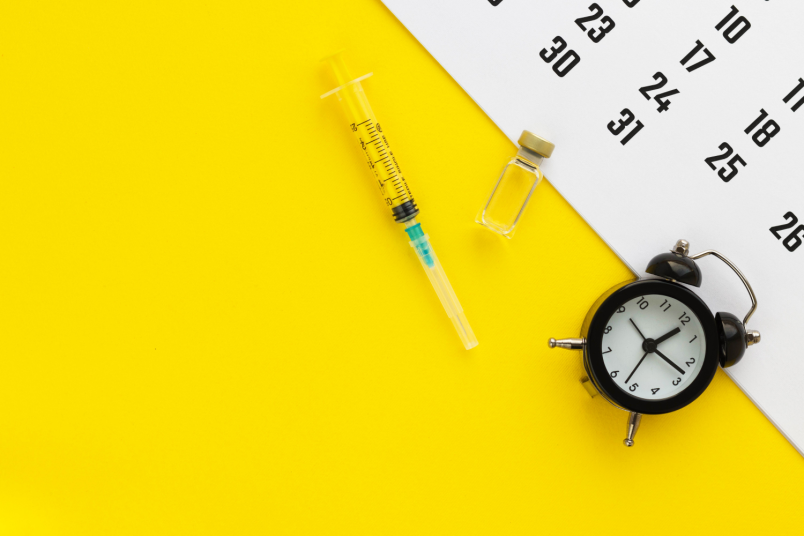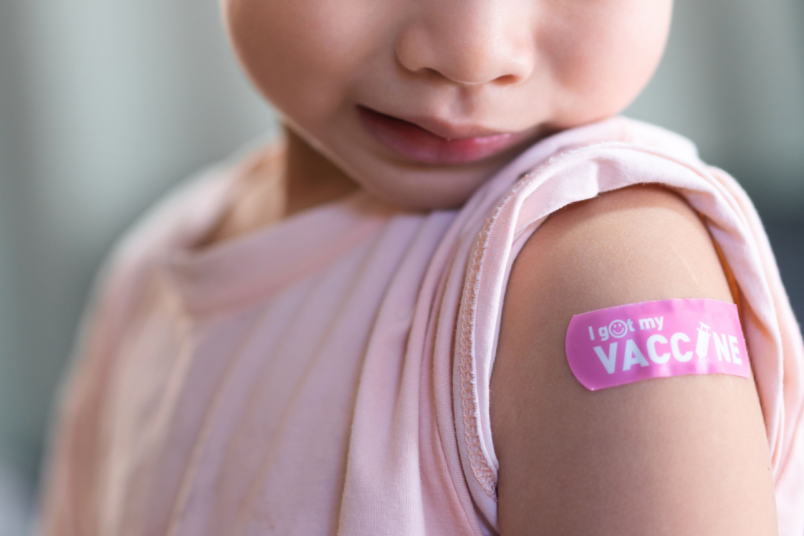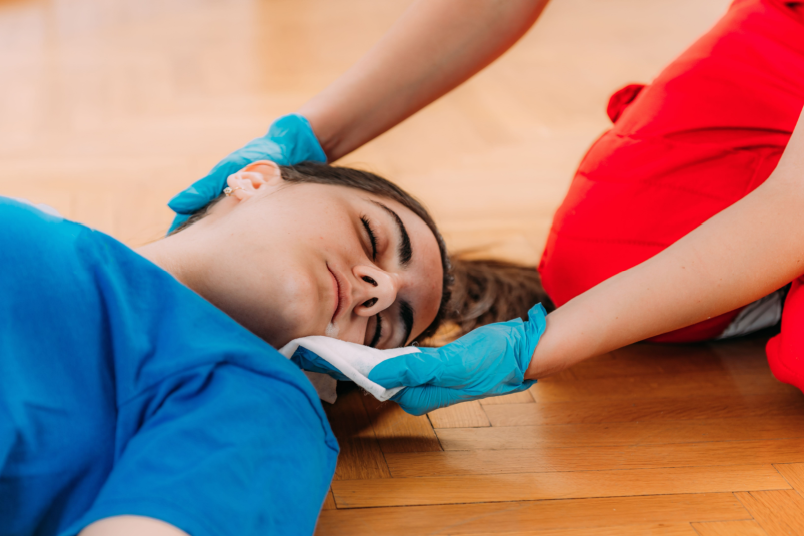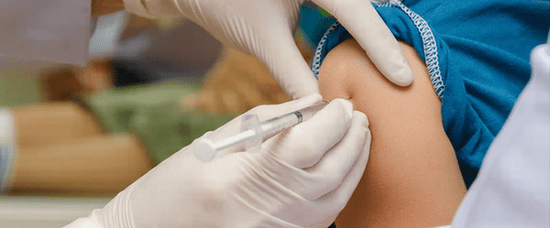Becoming new parents is one thing and managing a new life is another game altogether. And with that, the baby’s safety and protection become a top priority whether the parents or family is ready for it or not.
Vaccines are synonymous with protection and security. It protects against microorganisms and preventable diseases. Whether you are a millennial, generation Z, or belong to the boomer generation, we all have heard vaccination slogans such as ‘Don’t hesitate, vaccinate, Prevent Birth Defect, Do Boond Zindagi ki, Stop Polio, Vaccinate’ etc.
Let’s discuss what parents can learn about vaccination for babies and its dos and don’ts.
With joy and overwhelming emotions, new parents also get loaded with additional responsibilities. Meaning the ever-increasing to-do list of a parent for their baby. Thus, many parents get a lot of questions such as these – an ideal time to get vaccinated, can the baby's vaccination be delayed, how can I take care of the baby after vaccination, etc.
The ideal time to get your child vaccinated…

Under the Universal Immunization Programme, immunization of children starts as soon as the child is born. Vaccination against tuberculosis (BCG), polio (OPV) and Hepatitis B (Hep B vaccine) is given to a child immediately after birth. After this, specific vaccines are given at recommended ages and routes as outlined in the National Immunization Schedule.
Benefits of timely vaccination:
Vaccines ensure the best protection for children when they are given at the right ages, and in the required number of doses. At a certain period of life, there is a maximum incidence of a particular disease. Therefore, to prevent harm caused by the disease, vaccines are provided at that particular age.
For example, the occurrence of Polio is maximum in children below 5 years of age; hence, vaccination against polio is given in routine immunization as well as in campaigns for children below 5 years of age. Similarly, the number of doses required is determined by the level of protection required to prevent serious infections.
The National Immunization Schedule clearly mentions different vaccines, ages at which they are to be given, and doses required for ensuring full protection from vaccine-preventable diseases.
Can vaccination for kids be delayed?

Dr. Palani Rajan P, Sr. Consultant Paediatrician & Neonatologist explains ‘If for some reason, there is a delay in receiving a vaccine or any dose of vaccines requiring more than one dose, vaccine should be provided as early as possible.’ It is important to understand that in case of delay, there is no need to restart the entire schedule; instead, the remaining schedule should be continued as recommended and completed.
Is scarring a normal reaction after BCG administration? What care should be taken in case of scarring after BCG vaccination?
Yes. Two weeks after administration of BCG vaccine, the place of injection usually becomes red and hard. It then changes to an elevation in the skin which grows to maximum size by the fourth week. This later crack, discharges pus, and gradually changes into crust (5-6 weeks), finally leaving a small scar (after 8 weeks).
Scarring is a normal reaction after BCG administration. Do not press or rub the injection site and do not apply anything (medicine, lotion, herbs, etc.) on the injection site. In case the child develops swelling or has a fever, you should visit the nearest health facility.
What should be done if a scar does not form after BCG vaccination?
There is no need to re-vaccinate the child even if there is no scar formation. There are some cases when a scar does not form after BCG vaccination, although the vaccine has developed protection against the disease.
Before Your Baby Gets Vaccinated:
Can a baby have vaccinations with a cold, cough or fever?
A sick child suffering from a mild illness (like cough, cold, or mild fever), mild diarrhoea, or vomiting can be safely vaccinated with injectable or oral vaccines. However, a child who has some serious illness or is hospitalized (like with high-grade fever, severe diarrhoea, etc.), should not be vaccinated until his or her condition improves.
Do's and Don'ts after vaccination:

How long does vaccination pain last?
In the case of injectable vaccines (like Hepatitis B, pentavalent, DPT, and IPV), infants may have redness, mild pain, and swelling at the injection site. This is absolutely normal and goes away within 1-3 days. This is not related to the quality, safety, or efficacy of vaccines.
To provide relief to the child, put a pad of clean cloth dipped in cold water on the injection site. If advised and provided by a health worker, Paracetamol (syrup or tablets in divided doses) can be given to the child. Please take your child to the nearest health facility if the symptoms persist even after three days.
What causes fever after getting vaccinated? How can it be managed?
The occurrence of mild fever (specifically after Pentavalent and DPT vaccines) is a result of normal reactions that vaccines have on the body system. This fever is generally mild in nature, self-limiting, and goes away within 1-2 days. Paracetamol (syrup or tablets in divided doses) that is provided to you by the health worker can be given to the child to provide relief.
Can more than one vaccine be administered safely to my child at the same time? What is its benefit?
Yes. More than one vaccine can be administered to your child safely at the same time. It does not cause any adverse events nor has any effect on the effectiveness of individual vaccines. Administering more than one vaccine as per schedule to a child during the same immunization session reduces the number of your visits and avoids extra travel and time to get your child vaccinated.
Since India is declared polio-free, why vaccination against polio is given to children in routine immunization as well as during pulse polio campaigns?
Even though India has been declared polio-free, polio infection is still present in some countries. There is a constant risk of an infected person traveling into India and spreading polio infection. Therefore, it is important to vaccinate children and keep their protection level high till polio virus is finished from the world.
Precautions After Vaccinations:

You must wait for half an hour at the session site after vaccination to ensure immediate care and response in case there is any minor adverse event.
· Continue breastfeeding or complementary feeding after vaccination, even after oral vaccines.
· You must ensure that no medicine or herb is applied to the injection site.
Thus, vaccination helps to prevent the spread of infections to other people, especially those who are vulnerable or have weak immune systems. And it is vital that parents understand its importance and benefits.
Hence, the need of the situation is to ask your paediatrician or children’s doctor for more information on health practices, vaccines, diseases including COVID-19 and other life-threatening diseases. It is of utmost critical to not simply rely on messages forwarded or shared on WhatsApp, negative news shared on social media platforms, digital or print media.
Since we live in a technologically advanced era, information and news are flooded from all areas and it is our duty to discern factual data from fake ones.
Conclusion:
Vaccination is a safe and effective way to protect your child from many serious diseases that can cause severe complications or even death. By vaccinating your baby, you are not only giving them the best chance to grow up healthy and strong, but also contributing to the well-being of your community and the world.
If you have any questions or concerns about vaccination, please consult your Paediatrician & Neonatologist. They can give you more information and advice on the benefits and risks of vaccination, as well as the recommended schedule and doses for your baby.
